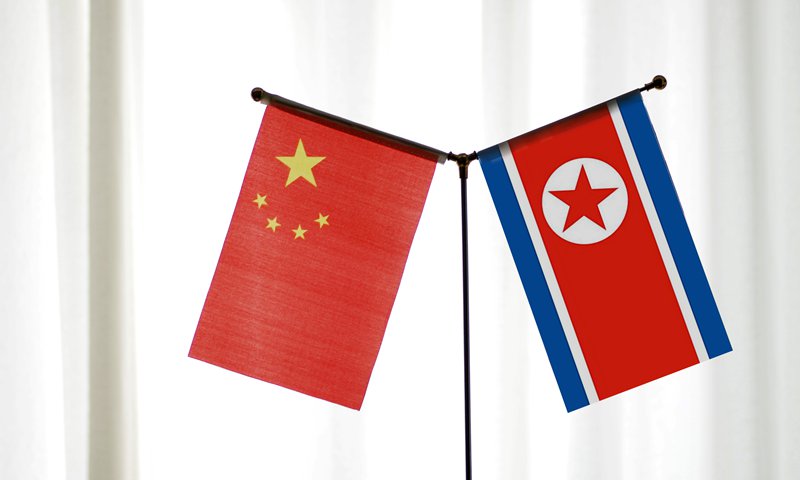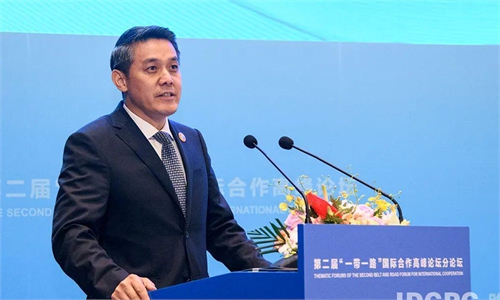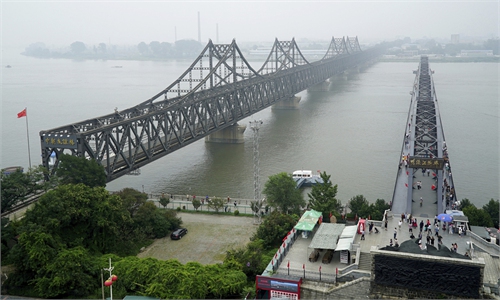China, N.Korea 'to stand close' when US military presence worsens Peninsula tensions

China North Korea Photo: IC
Li Hongzhong, vice chairman of the National People's Congress Standing Committee, will lead a Chinese Party and government delegation to North Korea on Wednesday, the International Department of the Communist Party of China (CPC) Central Committee announced on Tuesday. The delegation will attend activities in the Democratic People's Republic of Korea (DPRK) to commemorate the 70th anniversary of the Korean War Armistice, said the announcement.
Li, also a member of the Political Bureau of the CPC Central Committee, is the most senior Chinese official to visit North Korea since the outbreak of the COVID-19 pandemic. Chinese experts said the visit is proof of the unbreakable relationship between China and North Korea, with high-level mutual trust and cooperation when the world is in turbulence and the Korean Peninsula situation is becoming more tense, due to the increasingly provocative US military presence including the latest deployment of nuclear-powered submarines in the region.
Mao Ning, a spokesperson of the Chinese Foreign Ministry, said at the routine press conference on Tuesday that "China and the DPRK are friendly neighbors linked by mountains and rivers. Our two parties and the two countries have had a good tradition of friendly exchanges."
This year marks the 70th anniversary of the armistice of the Korean War. Having a high-level Chinese delegation visit North Korea and mark the occasion shows the high importance both sides attach to our bilateral ties, Mao noted.
"We believe this visit will contribute to the sound and stable growth of bilateral relations, to regional peace and stability, and to creating conditions for the political settlement of the Korean Peninsula issues," Mao said.
Han Xiandong, a professor at the China University of Political Science and Law, told the Global Times on Tuesday that "in 2013, when commemorating the 60th anniversary of the armistice of the war, China also sent a senior delegation led by Li Yuanchao, then Chinese Vice President. He was also a member of the Political Bureau of the CPC Central Committee at that time, just like Li Hongzhong."
A key difference is that the delegation led by Li Yuanchao in 2013 was called "a Chinese delegation" while the delegation led by Li Hongzhong this time called "a Chinese Party and government delegation," Han told the Global Times, saying that this shows the two countries highly value the ties between the two Parties and are willing to comprehensively develop the traditional relationship.
As Soviet Union was another key party who was involved and contributed to the armistice 70 years ago, Russia announced on Tuesday that it will send a senior delegation led by Defense Minister Sergey Shoigu to North Korea, who will visit from Tuesday to Thursday. According to TASS, the delegation will take part in "festive events marking the 70th anniversary of the DPRK's Victory in the Fatherland Liberation War of 1950-1953 (also known as the Korean War)."
Russia's Defense Ministry said in the announcement that the Shoigu's visit "would contribute to strengthening bilateral military ties and mark an important stage in the development of cooperation between the two countries."
Wang Junsheng, a research fellow in East Asian studies at the Chinese Academy of Social Sciences in Beijing, told the Global Times on Tuesday that the 70th anniversary of the Armistice of the Korean War comes at a very special time, as the international environment is in turbulence caused by severe competition and confrontation among major powers.
Apart from the ongoing Ukraine crisis in Europe, the shadow of bloc confrontation has emerged in Northeast Asia due to the increasing interactions and provocative activities made by the US and its two regional allies South Korea and Japan, Wang noted.
"In addition, after the three-year pandemic, North Korea still maintains its strict border controls, so at this special time, the visit of a delegation led by Chinese senior official is a signal to the world that China and North Korea will keep standing with each other to jointly overcome challenges on all fronts, and will jointly safeguard world and regional peace," Wang said.
According to the Associated Press, North Korea "fired two short-range ballistic missiles into its eastern sea," the South Korean military said Tuesday, adding to a recent streak in weapons testing that is apparently in protest of "the US sending major naval assets to South Korea in a show of force."
The US deployed a nuclear-armed submarine to South Korea on July 18 for the first time in four decades. On Monday, a US nuclear-powered submarine arrived in South Korea, only days after the first US nuclear-armed submarine's deployment, Reuters reported.
When Washington is being increasingly provocative, worsening the situation in the Peninsula by taking more aggressive military actions, the US and its Western allies are trying to push China to ramp up pressure on North Korea. Reuters reported on Saturday that, "the Group of Seven, European Union and three other countries" - Australia, New Zealand, South Korea - plan to appeal to China for help to "stop North Korea evading United Nations sanctions by using Chinese territorial waters," according to their letter seen by Reuters on Friday.
Mao, the Chinese Foreign Ministry's spokesperson, said on Monday that "When it comes to the implementation of the Security Council's resolutions, China has always earnestly fulfilled its international obligations."
Han said "on one hand, the US is adding fuel to the fire, while on the other, the US is asking China to put out the fire. This is ridiculous, ironic and arrogant." In developing ties with North Korea, China has its unbreakable and unshakeable determination no matter how the international and regional situation changes, Han noted.
"The future development of China-North Korea relations will not only benefit the two countries, but will also benefit the shared interests of the region and contribute to world and regional peace," Wang said.



